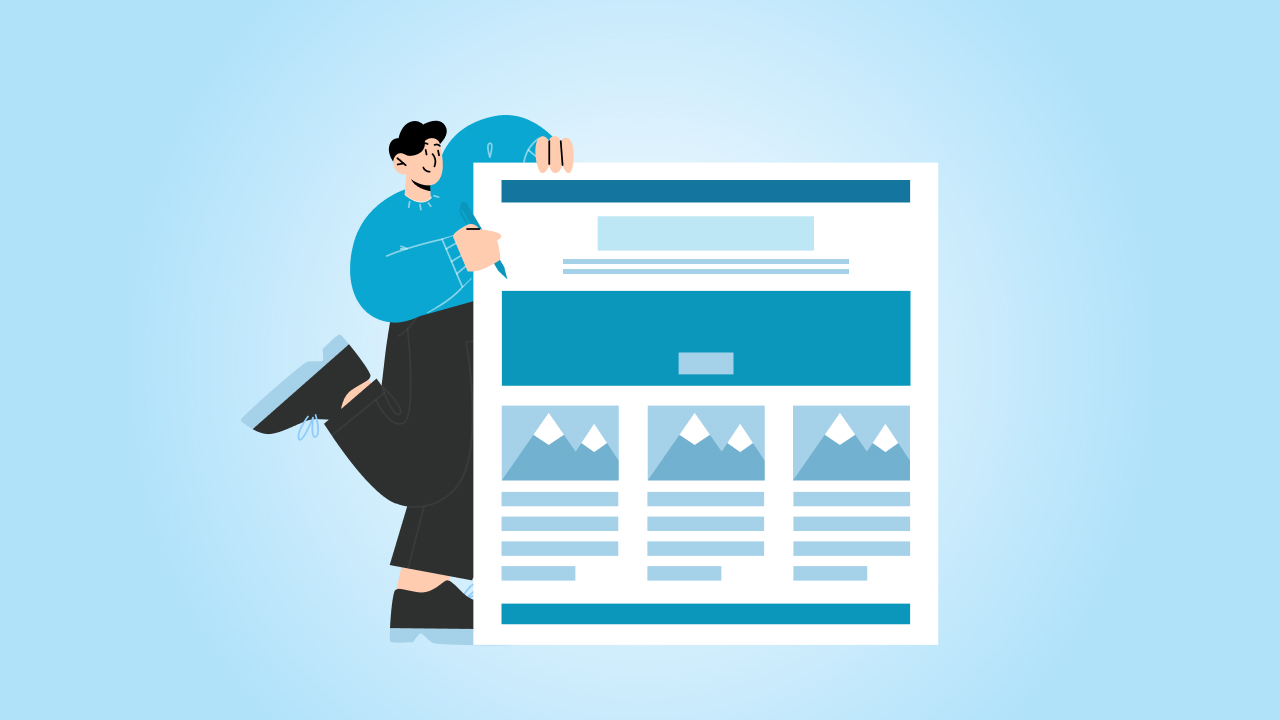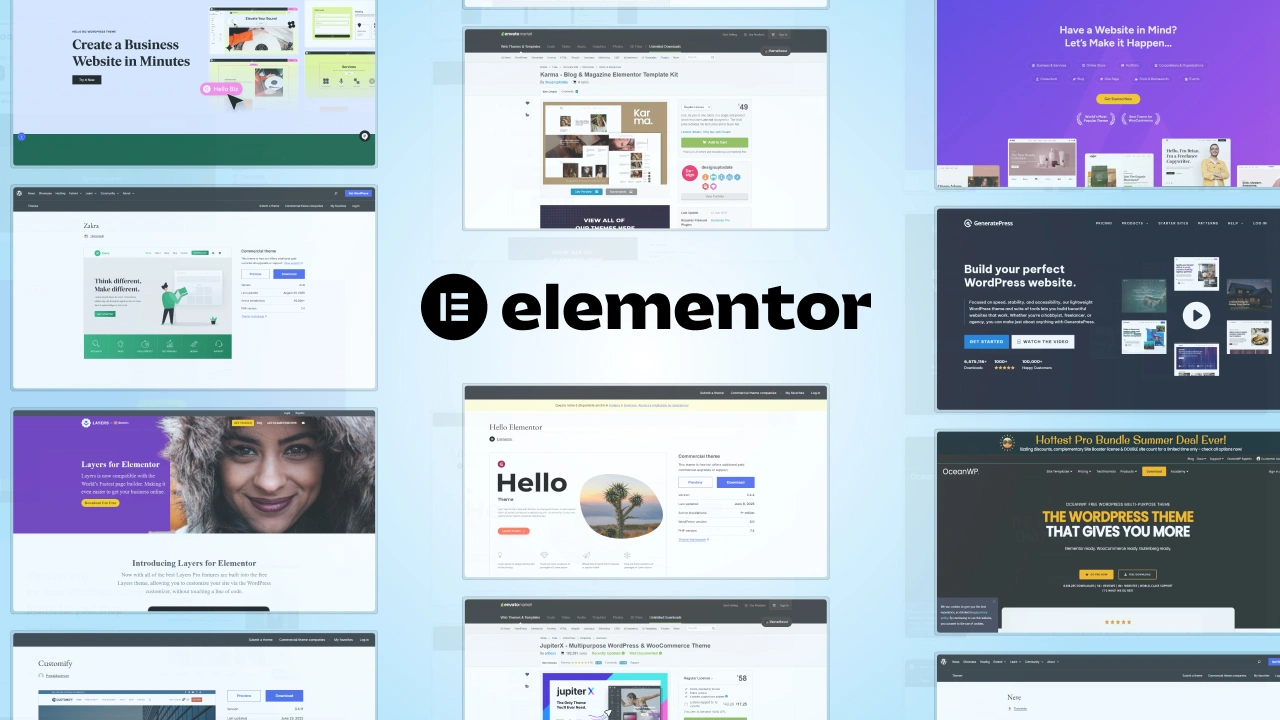Ever wondered why some websites captivate you instantly while others make you click away?
Well, the secret often lies in the platform they’re built on. So choosing the right platform for your website is like laying a solid foundation for your dream home—it determines everything from functionality and design to scalability and user experience.
When it comes to choosing between WordPress vs. Custom website, the right choice can skyrocket your online presence, while the wrong one might hold you back. So, how do you decide which path to take?
WordPress vs Custom Website – Two Popular Options
Let’s talk about WordPress and custom websites— the two popular choices for building your online presence.
First up is WordPress. You’ve probably heard of it since WordPress powers over 43% of all websites out there.
Why is it so popular?
Because it’s user-friendly and versatile. Whether you’re a blogger, running a small business, or even managing a large company, WordPress has something for all of you. With its vast library of plugins and themes, you can easily add features and customize your site without needing to be a tech expert.
Then there’s the custom websites. Imagine a website built just for you, tailored to your exact needs and preferences, much like a bespoke suit. Custom websites design offer complete control over design and functionality, ensuring your site looks unique and works exactly how you want it to. While going custom usually means investing more time and money upfront, the payoff is a website that truly represents your vision and stands out from the crowd.
WordPress: Overview and Advantages
What is WordPress?
WordPress is a powerful content management system (CMS) that allows you to create and manage websites with ease. Originally developed as a blogging platform in 2003, it has since evolved into a versatile tool used to build a variety of websites, from personal blogs to complex e-commerce sites and large corporate websites. WordPress is open-source, which means it’s free to use and continuously improved by a global community of developers.
Pros of Using WordPress
- Easy to Use and Manage: WordPress is known for its user-friendly interface, making it accessible even for beginners. You don’t need to be a tech expert to create and manage content, customize your site’s appearance, or install plugins. The intuitive dashboard simplifies tasks like updating content, uploading images, and configuring settings.
- Large Community and Support: With millions of users worldwide, WordPress boasts a vast and active community. This means you have access to countless resources, including forums, tutorials, and documentation. If you run into any issues, chances are someone else has already solved the same problem, and you can find help quickly.
- Extensive Plugin Ecosystem: One of WordPress’s greatest strengths is its extensive library of plugins. These add-ons allow you to enhance your site’s functionality without needing to code. From SEO tools and social media integrations to e-commerce solutions and security enhancements, there’s a plugin for almost everything you might need.
- Cost-Effective for Many Projects: WordPress itself is free, and many themes and plugins are either free or reasonably priced. This makes it a cost-effective solution for a wide range of projects. Whether you’re starting a personal blog, a small business website, or even an online store, WordPress can help you achieve your goals without breaking the bank.
Types of Projects Best Suited for WordPress
WordPress is incredibly versatile and can be used for various types of projects. Here are some of the most common:
- Blogs and Personal Websites: Originally designed as a blogging platform, WordPress is still a top choice for bloggers and individuals wanting to create personal websites. Its easy-to-use content editor and wide range of themes make it simple to publish and manage posts.
- Small Business Websites: For small businesses, WordPress offers a cost-effective way to establish an online presence. You can showcase your products or services, share company news, and connect with customers through contact forms and social media integrations.
- E-commerce Sites: With plugins like WooCommerce, WordPress can be transformed into a fully functional e-commerce platform. This allows businesses to sell products online, manage inventory, and process payments seamlessly.
- Portfolios and Creative Projects: Artists, photographers, and designers often use WordPress to create stunning online portfolios. With customizable themes and gallery plugins, you can showcase your work in a visually appealing and professional manner.
- Educational Websites and Online Courses: WordPress is also a great choice for educational institutions and individuals offering online courses. Plugins like LearnDash and LifterLMS enable you to create and manage courses, track student progress, and facilitate online learning.
Custom Websites: Overview and Advantages
What is a Custom Website?
A custom website is a site built from the ground up to meet your specific needs an d requirements. Unlike platforms like WordPress, which use pre-designed templates and plugins, a custom website is designed and developed by professionals who write the code from scratch. This approach allows for a unique design, tailored functionality, and optimized performance, ensuring that the website aligns perfectly with your vision and business goals.
Pros of Building a Custom Website
- Complete Control Over Functionality: With a custom website, you have total control over every aspect of your site’s functionality. You’re not limited by the constraints of a CMS or pre-made plugins. Instead, you can create custom features and integrations that serve your specific needs, whether it’s a unique e-commerce solution, a custom booking system, or complex user interactions.
- Unique Design and User Experience: Custom websites offer unparalleled flexibility in design. Your site can be crafted to reflect your brand identity and provide a unique user experience that stands out from the competition. Every detail, from layout and graphics to navigation and interactivity, can be tailored to create an engaging and memorable experience for your visitors.
- Scalability and Performance Optimization: Custom websites are built to scale with your business. As your needs grow, your site can be expanded and optimized for performance. You’re not restricted by the limitations of a CMS, so you can implement advanced caching, efficient database queries, and other performance enhancements to ensure your site runs smoothly, even as traffic increases.
- Tailored to Specific Business Needs: Because they’re built from scratch, custom websites can be tailored to meet the precise needs of your business. Whether you require specialized functionality, integrations with third-party systems, or compliance with specific industry regulations, a custom website can be designed to meet those requirements perfectly.
Types of Projects Best Suited for Custom Development
Custom websites are ideal for a variety of projects, particularly those with unique requirements or high complexity. Here are some examples:
- Large-Scale E-commerce Platforms: For businesses with extensive product catalogs, custom pricing models, or complex inventory management needs, a custom e-commerce website can provide the flexibility and scalability necessary to handle these challenges effectively.
- High-Traffic Websites: Websites expecting significant traffic, such as news sites, social networks, or popular blogs, benefit from custom web development. Custom solutions can optimize performance and ensure the site remains fast and reliable even under heavy load.
- Specialized Online Services If your business offers specialized online services, such as custom financial tools, proprietary software, or bespoke booking systems, a custom website allows you to build the exact functionality you need, integrated seamlessly with your backend systems.
- Unique Brand Experiences Companies that rely heavily on their online presence to create a strong brand image, such as high-end fashion brands, luxury hotels, or innovative tech startups, often choose custom websites to deliver a distinctive and immersive user experience that reflects their brand ethos.
- Industry-Specific Requirements Industries with specific regulatory or compliance requirements, such as healthcare, finance, or legal services, may require custom websites to ensure they meet all necessary standards while providing a secure and functional user experience.
Factors to Consider When Choosing
When deciding between WordPress and a custom website, several factors should guide your decision-making process. Each option offers distinct advantages and considerations that can significantly impact your website’s success and how well it aligns with your business goals. Let’s explore these factors in more detail:
1. Budget and Timeline
Budget: Consider your financial resources. WordPress is generally more cost-effective upfront due to its free core software and many free plugins and themes. Custom websites, however, often require a larger initial investment due to website development costs.
Timeline: Evaluate your project timeline. WordPress can be set up relatively quickly using pre-built themes and plugins. Custom websites, on the other hand, typically require more time for planning, design, and development.
2. Technical Expertise and Resources
Technical Expertise: Assess your team’s skills or your own ability to manage and customize a website. WordPress is designed to be user-friendly, making it accessible to users with minimal technical expertise. Custom websites may require advanced coding knowledge or the assistance of professional WordPress developers.
Resources: Consider the availability of resources. WordPress has a large community and extensive documentation, making it easier to find support and solutions to issues. Custom websites may require dedicated resources for ongoing maintenance and updates.
3. Scalability Requirements
Scalability: Think about your growth projections. WordPress is scalable and can handle moderate to high levels of traffic with proper optimization and hosting. Custom websites offer tailored scalability options, allowing you to build infrastructure that grows seamlessly with your business.
4. Customization Needs
Customization: Evaluate your need for unique design and functionality. WordPress provides a wide range of themes and plugins for customization, but custom websites offer unlimited possibilities for bespoke design and tailored features.
5. Long-Term Maintenance and Support
Maintenance: Consider ongoing maintenance requirements. WordPress releases regular updates for security and functionality, but managing plugins and themes requires vigilance. Custom websites may need less frequent updates but may require specialized support for any issues that arise.
Support: Assess your need for ongoing support. WordPress benefits from a large community and support ecosystem. Custom websites may require a dedicated support team or developer for troubleshooting and updates.
Comparison of WordPress vs Custom Websites
| Factor | WordPress | Custom Websites |
|---|---|---|
| Development Time and Cost | Quick setup with pre-built themes/plugins | Longer development time Higher initial cost due to custom development |
| Flexibility and Customization | Versatile with thousands of themes/plugins | Complete control over design and functionality Fully customizable to meet specific needs |
| Security Considerations | Generally secure; popular target for hackers | Can be built with security in mind from the ground up Full control over security measures |
| Performance and Speed | Performance depends on hosting and optimization | Optimized for performance from development stage Scalable and efficient code |
| SEO Capabilities | SEO-friendly with plugins like Yoast SEO | Customizable for specific SEO requirements Full control over site architecture |
| Maintenance and Support | Large community support and updates | May require dedicated support Less reliance on external plugins for functionality |
Case Studies or Examples
Successful WordPress Implementations
1. The Walt Disney Company
- Overview: Disney uses WordPress for its Disney Parks Blog, showcasing news, events, and stories from its theme parks around the world.
- Benefits: WordPress allows Disney to manage a high-volume blog with ease, integrate multimedia content seamlessly, and engage a global audience effectively.
2. TechCrunch
- Overview: TechCrunch, a leading technology news website, runs on WordPress.
- Benefits: WordPress enables TechCrunch to publish breaking news, feature articles, and reviews while maintaining a user-friendly interface and robust backend for content management.
Noteworthy Custom Website Projects
1. Tesla
- Overview: Tesla Motors website is a custom-built platform tailored to showcase their electric vehicles, energy products, and solar solutions.
- Benefits: The custom website integrates advanced features like interactive product showcases, real-time updates, and seamless e-commerce functionality, providing a unique user experience aligned with Tesla’s brand image.
2. Airbnb
- Overview: Airbnb’s platform for hosts and guests is a custom-built solution to facilitate bookings and property management worldwide.
- Benefits: Custom development allows Airbnb to handle complex transactions, integrate diverse property listings, and support a large-scale global marketplace with personalized user experiences.
3. SpaceX
- Overview: SpaceX’s website is custom-designed to provide information on space missions, rocket launches, and innovations in space travel.
- Benefits: Custom development supports real-time updates on mission status, live streaming of launches, and interactive features for enthusiasts and stakeholders interested in space exploration.
Decision-Making Framework
Questions to Ask Yourself
When deciding between WordPress and a custom website, consider the following questions to clarify your needs and priorities:
- What are my specific website goals and objectives?
Define the purpose of your website (e.g., informational, e-commerce, portfolio) and what outcomes you hope to achieve. - What level of control do I need over design and functionality?
Determine how much flexibility and customization are essential for your project. - What is my budget for initial development and ongoing maintenance?
Assess your financial resources and determine how much you can invest in building and maintaining your website. - How important is scalability for my business growth?
Consider your long-term plans and whether the chosen platform can support future expansion and increased traffic. - Do I have the technical expertise or resources to manage and update the website?
Evaluate your team’s skills or ability to handle technical aspects like updates, security, and troubleshooting. - What timeline am I working with for launching the website?
Determine your project timeline and whether you need a quick setup or have flexibility for a more extended development phase.
Evaluating Your Project Requirements
- Functionality Requirements
List your website’s specific features and functionalities (e.g., e-commerce capabilities, user registration, integrations with third-party services). - Design Preferences
Describe the visual style and user interface requirements that align with your brand identity and target audience expectations. - Performance and Speed Needs
Consider factors like page load times, responsiveness across devices, and handling of high traffic volumes. - Security Standards
Outline any regulatory compliance requirements or industry-specific security standards your website needs to meet. - SEO and Marketing Goals
Define your SEO strategy and how your website will support digital marketing efforts, such as content optimization and lead generation. - Long-Term Maintenance Plan
Develop a strategy for ongoing updates, maintenance, and support to ensure your website remains secure, up-to-date, and functional over time.
Consulting with Professionals
- Web Developers
Engage with experienced web developers specializing in custom development or WordPress website development. Seek their expertise to understand the pros and cons of each option based on your project requirements. - Digital Strategists
Consult with digital strategists or consultants who can provide insights into aligning your website strategy with broader business objectives and market trends. - IT and Security Experts
If security is a critical concern, consult with IT professionals or security experts to assess vulnerabilities and determine the best practices for protecting your website and user data. - SEO Specialists
Work with SEO specialists to analyze how each platform supports search engine optimization and how it can impact your website’s visibility and ranking in search results.
Choosing the Right Platform for Your Project Success
The key to making the right choice lies in aligning the features and capabilities of each platform with your unique project requirements. Consider budget, timeline, scalability, customization needs, and long-term maintenance. Choosing the platform that best fits your specific needs ensures that your website not only meets immediate goals but also supports future growth and enhances user experience.
If you find yourself unsure or overwhelmed by the decision, don’t hesitate to seek professional advice. Consult with web developers, digital strategists, IT experts, and SEO specialists who can provide valuable insights and recommendations based on their expertise and experience. Their guidance can help you navigate complexities, optimize performance, and ensure the security and success of your website in the long run.
From custom CMS solutions to responsive web designs and powerful digital marketing tools, cmsMinds delivers results that matter.





